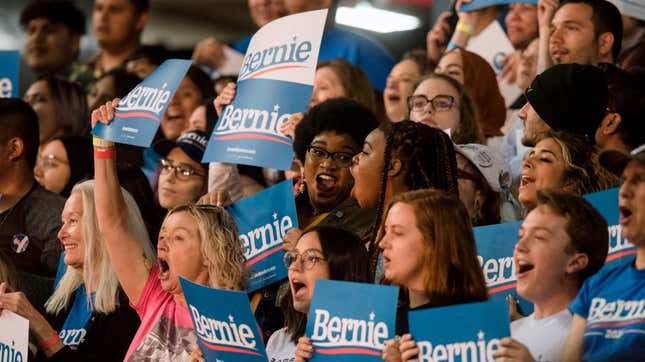
Image: Getty
When Senator Bernie Sanders lost the state of Michigan to former Vice President Joe Biden during the March 10 primary election—a state Sanders won in the 2016 Democratic primary, a state Sanders poured a slew of time, money, and resources into in a mad dash to fight Biden’s growing momentum—the blow was undeniable. The possibility of a Biden nomination shifted from possible to very likely overnight, and the Sanders campaign knew it.
But as the fawning narrative of Biden’s reverse in fortune—from debate dud and Iowa disappointment to Southern-sweeping comeback kid with black voters and suburban women in the bag—controlled the airwaves, those who came out and voted for Sanders were given little regard. While Biden went on to win the delegate count in the states of Michigan, Mississippi, Missouri, Idaho, and Washington that night (Sanders won in North Dakota), the demographic similarities were the same across the board, and have been largely consistent in every single primary race thus far: Sanders has the support of Latinx voters and voters under 45 of all races. Additionally, exit polls show that Democrats support universal healthcare
It’s Sanders’s multi-racial base of Millennials and Gen-Zers, who do in fact want a revolutionary takeover of the dysfunctional healthcare system, that Biden will have to win over if he becomes the Democratic nominee. And at a time when the coronavirus pandemic has put healthcare and the social safety nets Sanders has advocated for at the forefront of Americans’ minds, it is their support that Biden will need if he expects to get a large, enthusiastic turnout against President Trump in November.
That is, if he can stop himself from calling them a bunch of “Bernie Bros” first.
Throughout his campaign, Sanders has repeatedly disavowed the actions of the so-called Bernie Bros, and has since he ran against Hillary Clinton in the 2016 presidential primary, when the term first emerged into the popular lexicon. (“It’s disgusting,” he told CNN in February 2016. “Look, we don’t want that crap […] anybody who is supporting me that is doing the sexist things is—we don’t want them. I don’t want that. That is not what this campaign is about.”) Coined by Robinson Meyer in an October 2015 Atlantic article titled “Here Come the Bernie Bros,” Meyer characterized the archetype as white, male, and educated, with a personality that reeks of neckbeard “well, actually” energy and an obsession with sharing hot takes on social media. (“The Berniebro had an equal chance four years ago,” Meyer wrote, “of being (a) an Occupybro or (b) the kind of bro who asked, repeatedly and insistently, what Occupy’s concrete policy proposals were.”). In Meyer’s telling, the Bernie Bro was mostly harmless but certainly annoying. We all know one, fucked one, dated one, or were one. And the moniker stuck; it spoke to a specific kind of guy online that was, frankly, hard to ignore and even harder to tolerate, even if their points about neoliberalism’s failures were valid.
But as the 2016 primary continued, the Bernie Bro transformed into something more sinister: A brute of sexist vitriol and white rage, with Hillary Clinton as enemy number one and her supporters trailing just behind. While this was largely relegated to verbal sparrings on social media, the behavior of so-called Bernie Bros actually resulted in a few moments of tangible chaos, most notably one wild affair in May 2016 when Sanders supporters accused the Nevada Democratic Party convention of being “rigged” against Sanders, leading to a lot of chairs getting thrown around. The party chairwoman’s phone number was shared online, and she received a slew of death threats.
-

-

-

-

-

-

-

-

-

-

-

-

-

-

-

-

-

-

-

-

-

-

-

-

-

-

-

-

-

-

-

-

-

-

-

-

-

-

-

-








































